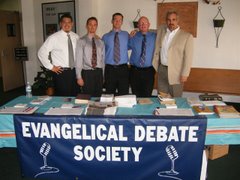by Lee Edward Enochs
Chairman,
The Evangelical Debate Society
As I reflect upon this issue with Chuck Smith Jr. and the Emergent Church Movement in general, I have noticed a distinct tendency within EC proponents to downplay the significance and theological contributions of the Magisterial Reformers Martin Luther, Martin Luther, Ulrich Zwingli and John Knox.
I have witnessed within EC an almost disdain of Luther the Reformers and conservative Evangelical theology in general and this troubles me, since Luther, Calvin and etc, are the foundational theologians of Evangelicalism in general and to not acknowledge their contributions makes me wonder if we should deem EC as a viable expression of true Evangelicalism at all or if we should label EC as a totally different movement from Evangelical Christianity.
The fundamental thesis I am attempting to postulate is that Martin Luther, John Calvin and the Protestant Reformation is what gave birth and impetus to Evangelical Protestantism in the first place, thus to refuse to acknowledge the positive contributions of the founding fathers of our faith is like saying that George Washington, Thomas Jefferson, Benjamin Franklin and the US Constitution has no relevance in socio-political discussions on the future of American Democracy today.I am afraid what is really at the heart of the Emergent Church controversy within American Evangelical Protestantism today concerns the validity of Post-modernity as a viable ideological foundation for Evangelical theology and polity today.
The EC movement is ultimately an attempt to synthesize what is perceived to be the best of both worlds: Evangelicalism and Post-modernity. However, there is a growing consensus within Conservative American Evangelicalism that the two movements are irreconcilable and are an unwise attempt at ecclesiastical and doctrinal syncreticism: an attempt at mixing two mutually exclusive world-views into a homogeneous spiritual movement.
The world renown German Philosopher Hegel saw this approach in terms of "Dialectical synthesis" wherein a thesis and its antithesis is merged forming a synthesis.Post-modernity and traditional Protestantism founded by Luther and Calvin cannot be successfully synthesized since they are at once two mutually exclusive world views that have two radically irreconcilable ideological starting points: foundationalism and propositional and ethical relativism.EC attempts two have the best of both worlds by maintaining a facade and external shell of adherence to Evangelical tradition and theology while attempting to utilize the entirely antithetical postmodern cultural hermeneutic, that seeks to obliterate doctrinal and ethical absolutes.EC cannot have the best of both worlds, either its proponents will lapse into non-Christian unbelief like the rest our Postmodern culture that is militantly opposed to traditional Bible based Evangelicalism or EC will return back to the Theo-centric, Christocentric and Bibliocentric centrality focus that differentiates Evangelicalism from all the other ideological and religious options.Historic Evangelical Protestantism is centered around propositional absolutes, that Almighty God exists and has spoken absolutely, objectively and coherently in the Bible which it deems to be the exclusively authoritative, infallible, inerrant and inspired Word of Almighty God and that God has communicated in a final salvific sense in the historical-redemptive forensic soteriological act of Jesus Christ upon the Cross.
Evangelicalism teaches that there are non-negotiable and unchanging theological and ethical norms based on the authority of Scripture that cannot be broken irrespective of the passing fancy of contemporary culture.In diametrical counter distinction to the objectivist and absolutist theological and ethical standard of historic Biblical Evangelicalism, the advent and cultural ascendancy of Post-modernity seeks to obliterate traditional ideological and ethical norms within Western Civilization and postulates that there is not such thing as absolute truth and morality.
EC attempts to synthesize post-modernity and Evangelicalism, but like attempting to mix oil and water, it will fail to make the engine that is the historic Church run, but will rather spun out on the road of bankrupt ideology like every other non-Bible based world view that has attempted to replace Evangelicalism as the truth.EC and Evangelicalism cannot be successfully synthesized because EC seeks to utilize post-modernity as an ideology and post-modernity is inherently relativistic, the diametrical ideological nemesis of historic Christianity that says God has spoken in an absolute and final matter.
Either EC will continue to go down the pathway towards propositional relativity or it will swing back to the historic Evangelical Church with its objective and unchanging doctrinal foundation and criteria for truth, it cannot have both.
Defending the Historic Evangelical Christian Faith in our postmodern and post-Christian times for the glory of Almighty God and the salvation of all peoples. We believe in the Trinity, the authority of the Bible alone, salvation is by grace alone through faith alone in Jesus Christ alone, based on the Bible alone for the glory of Almighty God alone, amen. Evangelical Debate Society Website: http://www.evdebate.com/
The Evangelical Debate Society

About Me
- The Evangelical Debate Society
- Lee Edward Enochs Chairman, The Evangelical Debate Society We are a Conservative, Bible based and Christ centered Evangelical Apologetics ministry dedicated to the defense of Evangelical Christianity and the promotion of the Gospel of Jesus Christ. We believe in the absolute and exclusive authority, inerrancy, infallibility and inspiration of the Bible in every respect and in all its parts. We believe the Bible is our only authority in all matters pertaining to Christian faith and practice including Christian Apologetics and debating. We believe in the doctrine of the Trinity, the full Deity of Jesus Christ, His virgin birth, sinless life and substitutionary atonement on the Cross of Calvary. We believe in the Protestant Reformation doctrine of justification by grace alone through faith alone in Jesus Christ alone based on the exclusive authority of the Bible alone all for the glory of God. We defend the Evangelical Christian faith likewise, all for the glory of God and believe that all men and women should repent of their sins and place their faith in Jesus Christ.